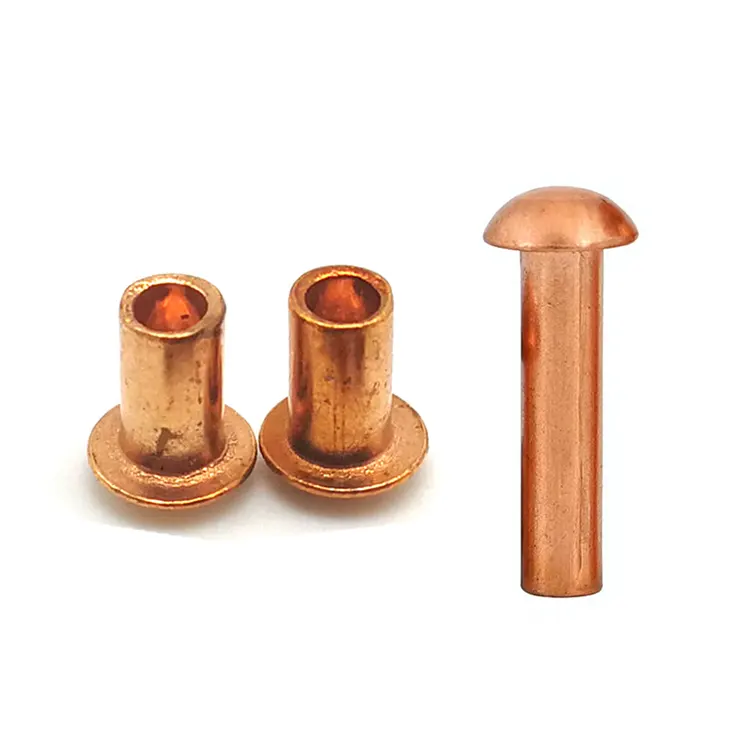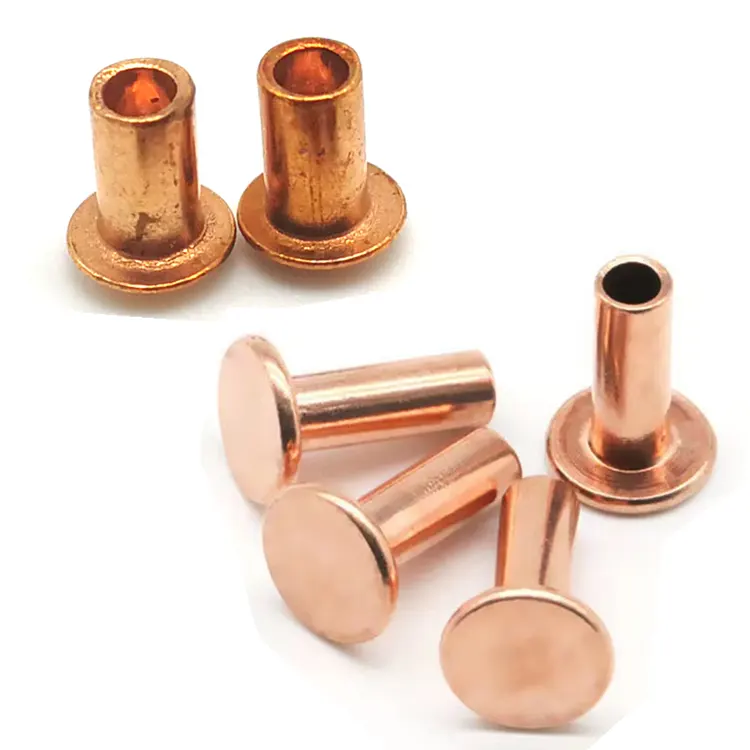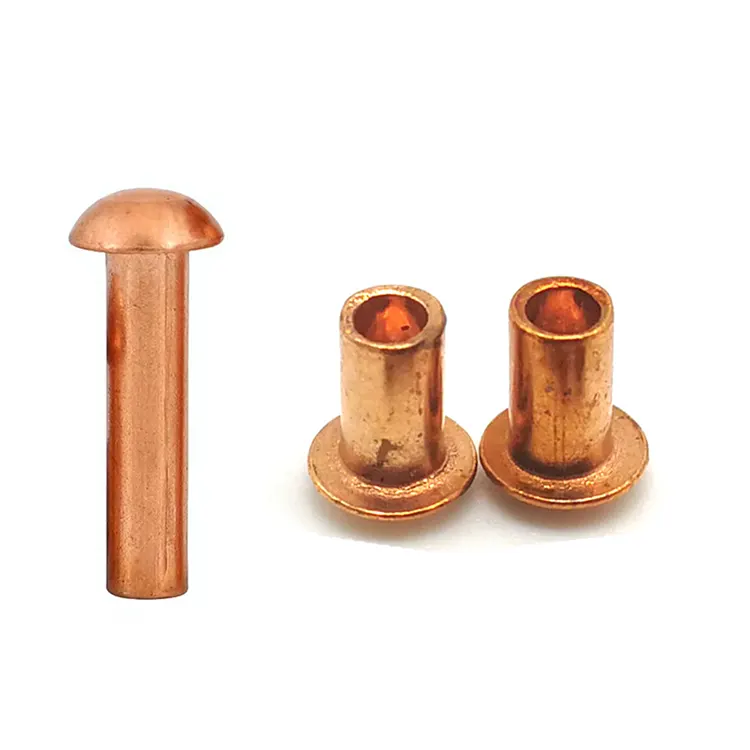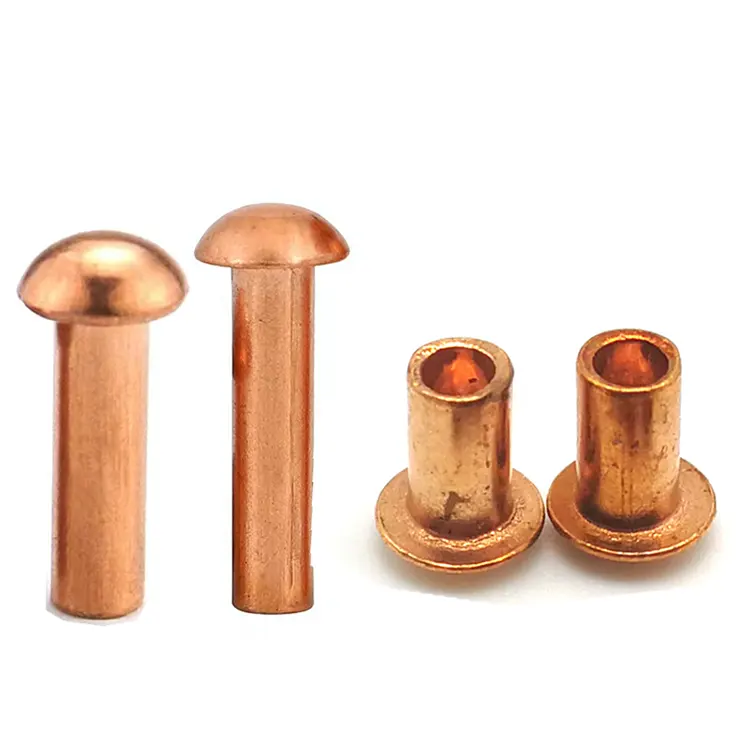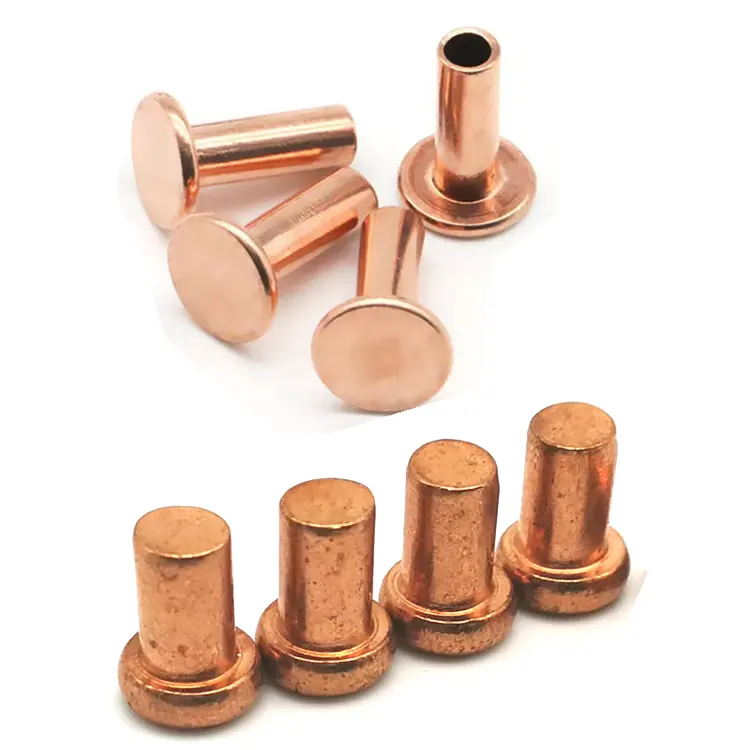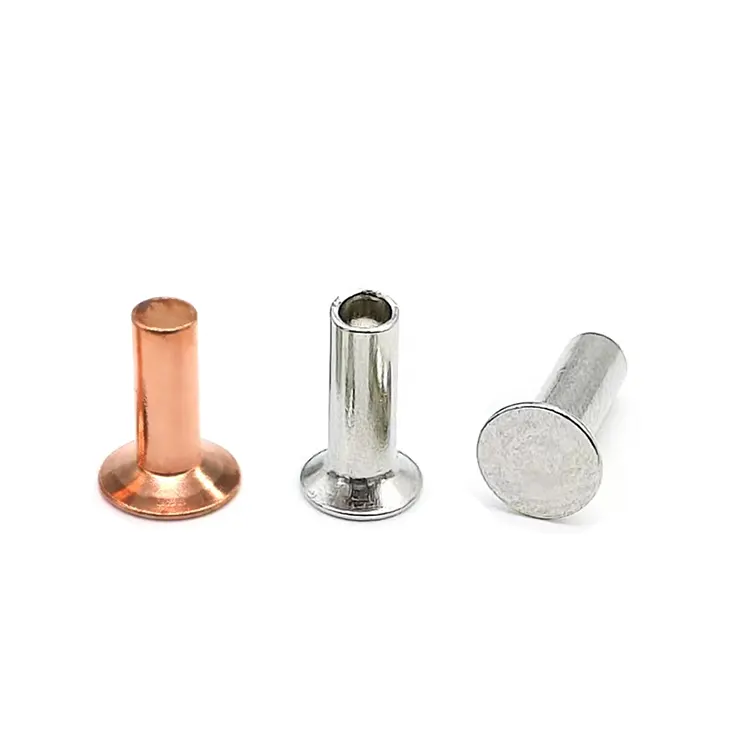Rebites
As one of professional manufacturer in China, Notin would like to provide you Rivets. And we will offer you the best after-sale service and timely delivery.
What is a rivet?
A rivet is a permanent mechanical fastener used to join two or more materials. Rivets work by inserting a metal pin into an aligned hole and deforming the end, creating a strong, secure, and durable connection. Unlike temporary fasteners like screws, rivets do not rely on threads, but instead form a permanent connection, making them ideal for applications requiring high strength, durability, and vibration resistance.
Classification of Rivets
Rivets are typically categorized by head shape, degree of hollowness, or material.
Based on head shape, rivets can be classified as flat head rivets, round head rivets, countersunk head rivets, mushroom head rivets, universal head rivets, truss head rivets, etc.

Based on degree of hollowness, rivets can be classified as solid rivets, semi-tubular rivets, or full tubular rivets.
Based on material, rivets can be classified as brass rivets, stainless steel rivets, steel rivets, aluminum rivets, copper rivets, etc.

What surface finishes are available for rivets?
Rivet surfaces are typically treated with rust-proofing treatments, primarily electroplating, including zinc plating, nickel plating, chrome plating, tin plating, gold plating, and silver plating. Electroplating is a common rust-proofing method for rivets. It applies a layer of plating to the rivet surface through physical or chemical methods. The plating effectively prevents corrosion and rust, while also providing a certain aesthetic effect.
Another special surface treatment method is head coating. Head coating is performed after the rivet is electroplated. This allows for a variety of colors on the rivet head, achieving an aesthetically pleasing finish.
Aluminum rivets cannot be electroplated, but they can be anodized. Anodizing also allows for a variety of color options, but the unit price is higher than electroplating.
Rust-proofing the rivet surface is crucial, effectively extending the rivet's service life and ensuring a secure connection. Different rust-proofing methods are suitable for different environments and applications, so the choice should be tailored to the specific situation.
- View as
Rebites de cabeça redonda de cobre
Os rebites de cabeça redonda de cobre são um tipo de fixador amplamente utilizado na fabricação industrial, fabricação de móveis e outros campos. O cobre, também conhecido como cobre livre de oxigênio, é uma liga de cobre de alta pureza caracterizada por excelente condutividade elétrica e térmica, bem como boa resistência à corrosão e ductilidade. Essas propriedades garantem que os rebites de cabeça redonda de cobre mantenham um desempenho estável em vários ambientes, prolongando sua vida útil. Além disso, o cobre possui certas propriedades antibacterianas, que podem reduzir o risco de crescimento bacteriano em produtos que entram frequentemente em contacto com o corpo humano.
consulte Mais informaçãoEnviar consultaRebites de cobre
Nuote Metals é um fabricante profissional de rebites localizado em Dongguan, China. Os rebites de cobre que fabricamos são feitos de cobre C1100. Os rebites de cobre são um fixador comumente usado. O cobre possui excelente condutividade térmica, o que o torna amplamente utilizado em aplicações elétricas e de dissipação de calor. Além disso, os rebites de cobre oferecem excelente usinabilidade e plasticidade, permitindo que sejam produzidos em diversos formatos e tamanhos.
consulte Mais informaçãoEnviar consultaRebites de cabeça panela de cobre
Os rebites de cabeça panela de cobre são de alta pureza e oferecem excelente condutividade, tornando-os adequados para aplicações que exigem alta condutividade. A Nuote Metals é especializada na produção de rebites de cabeça panela de cobre. Usamos classes com alto teor de cobre, como C1100, mas também podemos produzir classes personalizadas. Nossos rebites de cobre passam por um tratamento de superfície especial para resistir à oxidação e resistir a um teste de névoa salina de 48 horas.
consulte Mais informaçãoEnviar consultaRebites de cabeça de cogumelo de cobre
Os rebites de cobre com cabeça de cogumelo são componentes mecânicos usados para fixar dois ou mais materiais. Eles normalmente têm uma cabeça em forma de cogumelo e uma haste sólida ou semi-oca na outra extremidade. Durante a instalação, a outra extremidade é martelada ou golpeada com uma rebitadora especializada, fazendo com que ela se expanda e forme a outra cabeça, que então se encaixa no lugar. A Nuote Metals é especialista em rebites de cobre com cabeça de cogumelo. Oferecemos uma ampla gama de especificações de rebites e utilizamos mais de 40 máquinas de rebitagem de vários tamanhos para atender às necessidades do cliente.
consulte Mais informaçãoEnviar consultaRebites de cabeça chata de cobre
Nuote Metals, localizada em Dongguan, China, é um fabricante profissional de rebites. Nossos rebites são de alta qualidade e entrega garantida, o que lhes confere uma reputação favorável entre clientes nacionais e internacionais. Nossos rebites de cabeça chata de cobre são feitos de cobre de alta qualidade, oferecendo uma superfície lisa e delicada e uma sensação estável e firme. Seu design de cabeça chata não apenas aumenta a área de contato, mas também dispersa a pressão de maneira eficaz, garantindo uma conexão mais estável.
consulte Mais informaçãoEnviar consultaRebites de cabeça escareada de cobre
Os rebites de cabeça escareada de cobre produzidos pela Nuote Metals na China são fixadores de metal comuns usados principalmente na fabricação de máquinas, equipamentos eletrônicos, montagem de móveis e outros campos industriais. Como material metálico tradicional, o cobre possui excelente condutividade elétrica e térmica e resistência à corrosão, o que o torna popular em aplicações específicas. Os rebites de cabeça escareada são fixadores fabricados através de processos de encabeçamento a frio ou forjamento a quente. Sua estrutura simples requer ferramentas de rebitagem para criar uma conexão especializada.
consulte Mais informaçãoEnviar consultaWhat are the advantages of rivets over other fasteners?
1. Ease of Installation
Rivets are fast to install, and even fully automated for high-volume applications, resulting in a simple and efficient operation process.
2. Connection Reliability
The riveting process is standardized, with strict quality control, resulting in highly stable connections. Visual inspection allows for quick verification of connection quality.
3. Vibration and Impact Resistance
Rivets connect through deformation or interference fit, providing strong clamping force and excellent vibration resistance, capable of withstanding vibration and shock.
4. Low Cost
Rivets are easy to install and can be fully automated, saving significant labor costs.
What are the advantages and disadvantages of rivets made of different materials?
Aluminum Rivets
Advantages: Lightweight, reduces overall product weight, low cost, suitable for general civilian applications.
Disadvantages: Low tensile and shear strength, unsuitable for high-strength workpieces, prone to electrochemical corrosion when in contact with metals such as stainless steel.
Stainless Steel Rivets
Advantages: Strong corrosion resistance, high hardness, suitable for high-strength workpieces (such as marine equipment)
Disadvantages: Higher cost, typically more expensive than aluminum rivets of the same specification.
Brass and Copper Rivets
Advantages: Excellent conductivity (such as connecting electronic components), good corrosion resistance.
Disadvantages: Higher cost, more difficult to process.
Steel Rivets
Advantages: High hardness, high connection reliability, and wide applicability.
Disadvantages: Compared to other materials, iron rivets are more prone to rusting.
What are the main applications of rivets?
Rivets have a wide range of uses, from small items like a pair of scissors to large items like airplanes and ships, as well as in high-precision medical applications.
Industrial Manufacturing
Rivets are used in a wide variety of industrial fields, wherever there is a need to connect two or more materials.
Electronics
Rivets secure heat sinks and chips, providing both vibration damping and noise reduction, and are widely used in the cooling systems of electronic products such as computers and mobile phones.
Automotive
Rivets are widely used to connect components of automobile bodies and chassis, such as doors and hoods. Their lightweight and corrosion-resistant properties make them an indispensable joining method in automotive manufacturing.
Aerospace
In aircraft manufacturing, rivets are used to connect different fuselage components, such as wings and tailplanes. Millions of rivets create high-strength, corrosion-resistant joints. Aluminum and titanium alloy rivets are often used to connect components of corresponding materials, ensuring stability in extreme environments.
Rivets are used everywhere. The above examples only represent a small number of their applications. We see rivets everywhere in our daily lives, such as on scissors, folding beds, and strollers etc. Rivets can be customized to different sizes and materials depending on the application.
Nuote Metals has specialized in the rivet industry for over a decade. Our factory is located in Dongguan, a city known as the "World Factory," a city with a developed industry and convenient transportation. This allows us to respond quickly when acquiring raw materials and supporting surface treatments, meeting our customers' needs for quick access to samples and bulk orders. We produce 10 million rivets daily and have molds of various specifications, allowing us to produce rivets as small as 0.8mm and as large as 10mm. We welcome your inquiries and visits.







